Disability in Kidlit discusses the portrayal of disability in MG and YA fiction. We review books featuring major disabled characters, discuss tropes, and offer advice to authors wanting to include disabled characters in their works. Although we focus on MG and YA novels by major publishers, much of what we post can be applied to all fiction and other media (and real life, too). The main project is housed at our website, but we'll be cross-posting excerpts and reblogging relevant content here. Looking for books featuring characters with a certain disability? Feel free to send an ask! For our original content on Tumblr, check out our disability in kidlit tag. For themed lists of books featuring disabled characters: dikl list For disability-related quotes: dikl quote
Don't wanna be here? Send us removal request.
Video
youtube
Fact: Deaf babies, when exposed to ASL, start to babble with their hands and learn to produce handshapes just as hearing babies do. They proceed through a similar linguistic acquisition process.
Fact: When children have early language input of any type, they later develop better reading skills (in English) then children prohibited from learning language. Children who learn ASL early learn to read better.
Fact: Extended language deprovation causes children to be at risk in other areas of physical and emotional development
Fact: Language development lies at the core of human-emotional and mental development.
Fact: The brain processes signed languages just as spoken language. Signed languages are in no way inferior to spoken languages.
Fact: Just as everyone has the right to speak, everyone has the right to sign.
8K notes
·
View notes
Photo
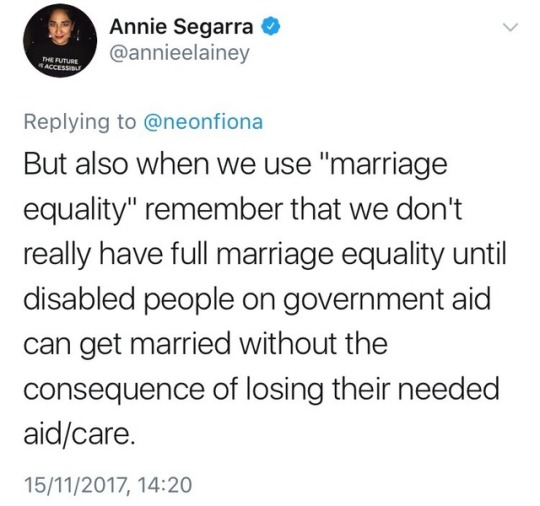
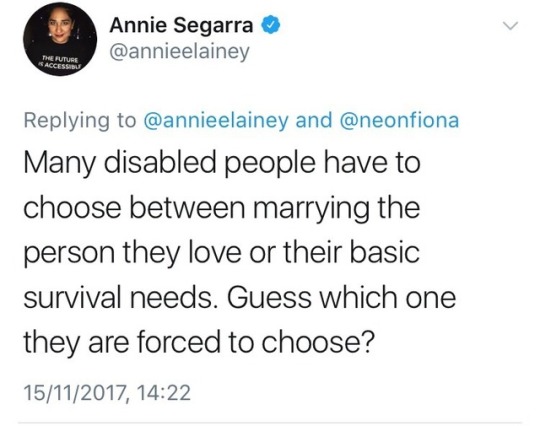
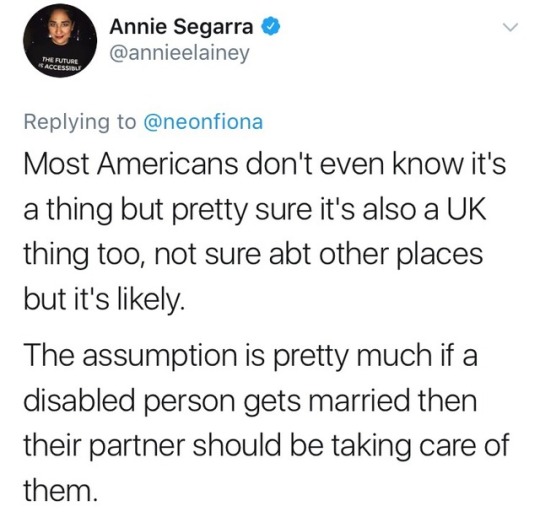
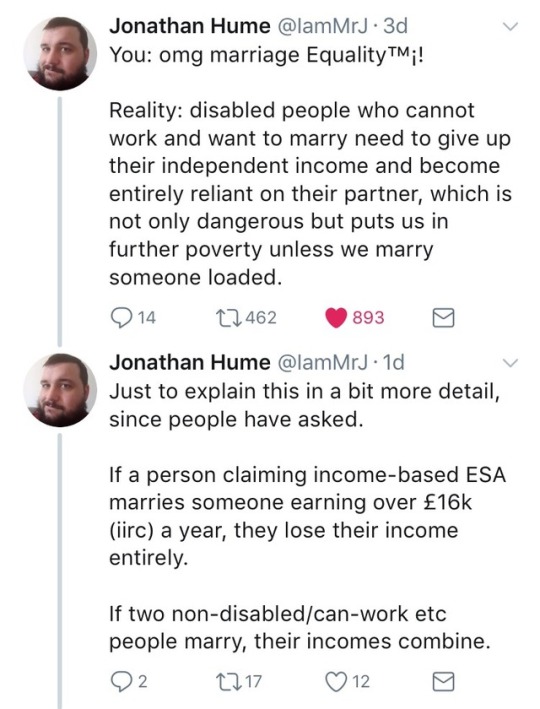
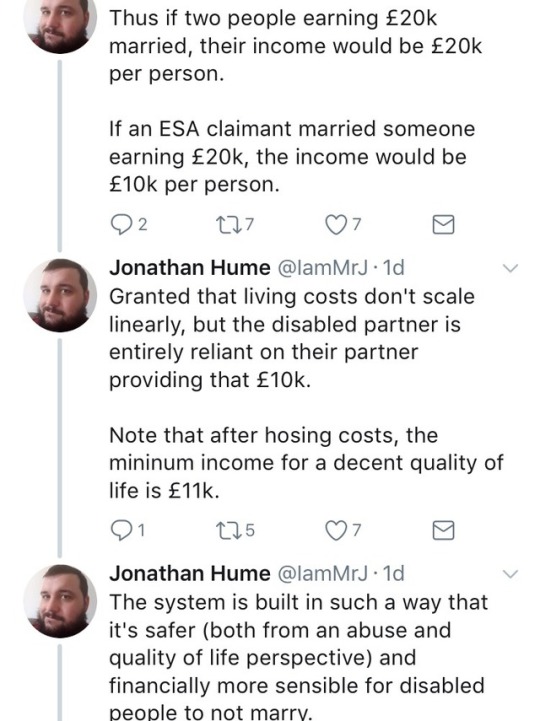
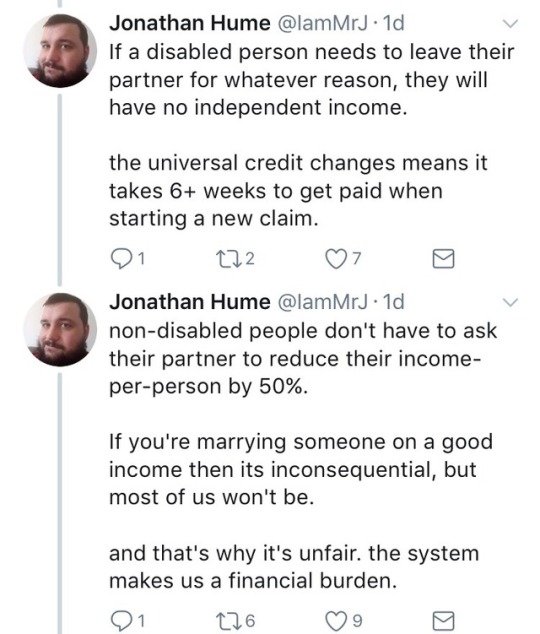
As disabled members of the lgbt community we should be celebrating marriage equality, right? but unfortunately us disabled people who rely on government support to survive risk losing everything and becoming totally financially reliant on our partners if we marry or even move in together.
sources: x x
60K notes
·
View notes
Text
cool disability psa!
hi everyone! so while the term “handicapped” is really outdated/problematic & we don’t use it to discuss pwd anymore, i still hear good, woke people use it to refer to parking spots/toilets/etc. like “the handicapped stall” or whatever. and i really think they do that bc they don’t know of a better term. so i’m gonna give you one! “accessible!!!!”
any time you’d say “handicapped,” say “accessible”
“oh, he has fibromyalgia, so he has an accessible parking permit” “due to her spinal cord injury, she has an accessible dorm room” etc etc
this is cool for two main reasons! 1 - you’re not using super outdated language and 2 - it puts the focus on the accessibility of the environment, not the personal impairment, which if you’ve done any reading on the social model of disability, you’ll know is a really good thing.
so spread the word, practice better disability politics, and spare me the inward cringe every time i have to hear the word “handicapped”
17K notes
·
View notes
Text
Make Video Games More Accessible By...
Dear game developers:
Make your games more accessible by
Allowing Button remapping
Supporting multiple kinds of controllers
Supporting multiple types of inputs for when solving puzzles or clues
Match the color and or pattern puzzle
Follow the sound and controller vibration to find the mcguffin
Allow for zooming in and out if you’re doing any kind of “pattern alignment” puzzle.
Subtitles on everything, for fuck’s sake
If your motion/camera thing’s instructions start with “stand up and….”, rethink your design.
Allow for adjusting the field of view
Aim assist.
If someone is struggling with a puzzle or task, start offering tool tips and hints on screen
Remember that the goal is not to have the player play the game like you would. The goal is for the gamer to have fun and experience the game and art you’ve spent so much time and energy to create in a way that brings them joy.
Removing and avoiding harmful tropes around disability - physical or otherwise.
6K notes
·
View notes
Text
I don’t think people realize just how much of so-called “high-functioning autism” is acting. It’s cultivating a neutotypical-friendly persona based on exaggeration of social norms you only partially understand and maintaining that persona under stress while trying to gather information to give context to behavior.
To be an autistic person who “passes” is to behave like a secret agent.
8K notes
·
View notes
Text
Things they don't tell you about being a first time wheelchair user in highschool
Literally everyone will ask if you broke your leg(s). Everyone. Even people you don’t know. Theyll ask a lot and think you’re extremely fragile.
bruises show up within the first day of rolling around, and they can really suck
people will try to grab your chair if they think you’re struggling and it can be hard not to snap at them for it
static electricity is a huge issue. You will probably either continuously shock your leg when you’re rolling around or do what I did today and zap someone so hard as you pass that both of you nearly keel over
people will call you out as a faker if you do anything even remotely fun ever on your wheelchair. Wheelies? Obviously your legs are fine lol not like you have to go down fucking curbs /s
puddles are the worst and if there’s a curb with a puddle all around and you have some ability to walk its a better idea to just stand up and navigate the chair than to fall backwards into said puddle
weird looks from people are inevitable, especially from people who don’t like you
bus drivers will often push your chair and give you advise you don’t want to hear, even if you tell them nicely you can push yourself. Its really hard not to get mad at them for it
no wheelies in school. Though if you do it in the elevator when no one else is with you you can’t really get caught.
speaking of wheelies, always be ready to throw at least one arm behind you in case you fall. They say tuck your chin in but its easier and more reliable to throw your hands back and keep your neck up so you don’t hit the floor. Sore arms are way easier to put up with than head injuries
don’t even bother to try and roll back up curbs. You will either be there for an hour or fall backwards. I managed to do both.
90% of classrooms that aren’t special ed are not very wheelchair accessible.
people will automatically assume you’re faking something if you’re not considered dumb enough in their standards to fit in with disabled students (aka high class ableism at its finest)
people are going to give you weird looks if you don’t suddenly start sitting with the other disabled kids
standard backpacks usually dangle way too much to keep on you easily, so try to pack light
built in storage on wheelchairs cannot sufficiently carry books
don’t try to hold an umbrella. Period. Especially not with your teeth. It doesn’t work.
don’t try to give the bus driver your ticket while you’re stuck on the ramp. And speaking of, its easy to start falling down the bus ramp so be careful, and when in doubt throw on the breaks
and finally if you’re like me pray to god you don’t go nonverbal when someone is trying to push you and you don’t want them to because it is hard to get them to stop if you can’t speak
able-bodied people can and should 1000% reblog this, some of these things I’ve seen on tips about using a wheelchair but a lot of these weren’t things I’ve seen
107K notes
·
View notes
Text
Use the Chair!
Wheelchairs do not make you lazy. They do not make life “too easy”
Abled people have this notion in their heads that we have to struggle. That our lives should be difficult because that’s what it means to be disabled. But, mobility should not be a struggle. Is walking a challenge for abled people? Do they have to constantly think about every step they take? No, because walking is natural to them. And sometimes, wheelchairs are natural for us.
It doesn’t mean you are lazy, or “taking the easy way out.” Use your wheelchair because you need it and it helps you move with ease. Use your wheelchair because it’s the same as an abled person using their legs.
Your life shouldn’t have to be a constant challenge just because you’re disabled. Sometimes it’s ok to take the easy road. So,if you want to, use the chair!
2K notes
·
View notes
Link
“I am a man with Down Syndrome, and my life is worth living.”
263 notes
·
View notes
Photo


Nicole Panteleakos reviews Elana K. Arnold’s A Boy Called Bat:
“The strongest element in the book is seeing how Bat feels, as opposed to how he is perceived, which could be beneficial both to those readers who know nothing about autism, and those who are autistic themselves. Even as an adult it is a struggle to navigate this gap, and it would have been great as a kid to see someone else with the same issue and how they handle it. I wish a little more time had been spent on some of his traits while others could have been dropped. For example, I loved how his food-related issues, like with chili and leftovers and liking the way gummy candies feel but not wanting to eat them, helped make him feel real, whereas his hypersensitive hearing and earmuffs felt a little unnatural in the way they were introduced and therefore unnecessary; they could have worked better if presented somewhat differently.”
Read the full review at Disability in Kidlit.
92 notes
·
View notes
Link
“When it comes to marginalized representation, visibility is important. There is incredible value in featuring covers with people of color front and center, or two boys or two girls kissing, and we need far more of those. It’s important for all teens to be able to see themselves reflected on book covers. We need to fight back against the common habit of minimizing any elements that might be seen as ‘risky.’“ via @disabilityinkidlit
103 notes
·
View notes
Text
When Abled People Make “That Chair” the Enemy
“It’s so good to see you finally out of that chair!” is not often a great compliment when the person receiving it has a chronic illness and/or fluid mobility; consider the tone used, consider the relief, it implies that it won’t be so good to see them when they need their wheelchair the next time you see them. It paints the use of a wheelchair as a moment of failure.
For many people this fluidity of symptoms is permanent, they will need different devices on different days and different moments.
Many people struggle with their abilities and the use of a wheelchair BECAUSE of the mentality that a wheelchair is a failure or “giving up”, they will push themselves beyond their limits; possibly injure themselves or trigger their symptoms to worsen because of this ableist idea.
Don’t make them feel ashamed or like they disappoint you when they have to use a particular device.
You could just finish that phrase a little bit earlier “It’s so good to see you!” End.
Normalize fluid mobility and fluid symptoms.
1K notes
·
View notes
Text
The Thing about Jellyfish by Ali Benjamin on Goodreads: https://www.goodreads.com/book/show/24396876-the-thing-about-jellyfish
any Autistics read The Thing About Jellyfish?
I’m in the middle of it now and it’s taken an odd turn. I do believe the protagonist is deliberately coded as autistic though it’s never directly stated.
I’d like to ask other Autistics about the specific plot twist and see whether or not it rang true/how it came across.
Just hit me up on Tumblr IM or shoot me an ask. Thank you!!
@disabilityinkidlit spare a boost for a curious Autistic?
12 notes
·
View notes
Photo


Dyscalculia and ADHD: A View From the Inside by David Howard:
“Dyscalculia doesn’t mean you’re just bad at math. It isn’t something that you can be educated out of. Nor is it a learning disability that makes you unable to do math. For people with dyscalculia, math is conceptualized differently. When, eventually, I learned rules or tricks for doing math (like the “finger trick” to quickly do problems with the 9s times table), I was able to perform math tasks well enough to pass my classes. But I still don’t understand why math works.
Dyscalculia can be mistaken for attention deficit/hyperactive disorder, and is often associated with it. About 20% of people with ADHD also have dyscalculia, as I do. Dyscalculia and its effects can be made worse by ADHD. ADHD makes it hard to work on something that isn’t interesting to you, and believe me, when you have dyscalculia, math is certainly not interesting.”
Read the full post at Disability in Kidlit.
174 notes
·
View notes
Link
“I want to discuss the work of disabled genre authors, or authors who celebrate disability in their work. Here’s five of them you’ve definitely heard of—some of them write about disability, some don’t, but ll of them have changed the landscape of SFF.”
558 notes
·
View notes
Photo
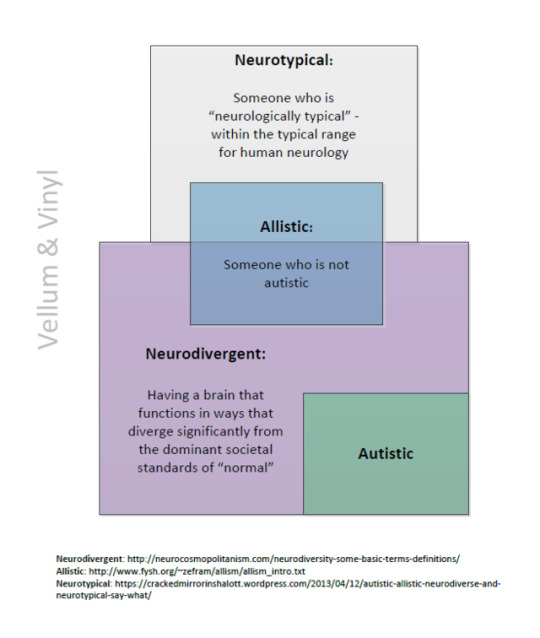
I put this together for folks who have trouble understanding the difference between Neurotypical, Allistic, Neurodivergent, and Autistic. Please share! Also, plug for V&V here
5K notes
·
View notes
Text
Disabled people’s lives are not tragedies. Parents and carers are not “heroes” for loving disabled people. Disabled people’s private moments should not be shared without consent on your “warrior mom” blog. Disabled people are not your pity hires, dates, or friends. Disabled people do not exist to be saved or spoken for by non-disabled people.
Treat disabled people with respect and dignity. Treat disabled people like people.
36K notes
·
View notes
Text
Shout out to my disabled/unhealthy fats
Don’t let people make you feel bad about your health
Your health is non of their concern
Take care of yourself for sure to the best of your abilities
But don’t let people dictate your life or how you feel about yourself!
You’re still babely
You still deserve love and respect
You are still worthy of dignity
You deserve all the good things in life
I see you out there! You’re not invisible to me!
You’re not a “bad” fatty
Don’t let anyone, not fatphobic thin people
Not fellow fats who ignore your struggles or silence you when you speak out about fat discrimination and the healthism you face
Make you feel like you are less, because you’re more!
Nobody! This is your life! Be happy
1K notes
·
View notes